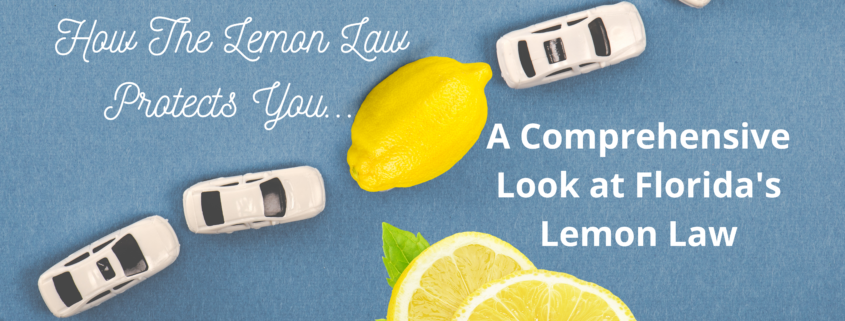Making Laws Out of Lemons
You cannot make lemonade without lemons, and you cannot be protected as a consumer without The Lemon Law. The Lemon Law is not that old. States began to enact their own lemon laws after the federal government first enacted the Song-Beverly Consumer Warranty Act in 1970. As it pertains to automobiles, the Lemon Law was put into place to allow for some semblance of accountability between consumers, manufacturers, and the products they produce. In this blog, we will take a comprehensive look into how the lemon law protects you as a consumer, best practices if you are involved in a lawsuit where the lemon law is applicable, and everything you need to know about why it exists in the first place.
What Qualifies As a “Lemon”?
On a simple level, the word lemon refers to a vehicle that has not been fixed after a certain period and cannot be fixed and made to work for the consumer. It is a defective item. If you’re vehicle has issues and has been at the dealership for more than 15 days you may have a Florida State lemon law case. The rights to utilize this law do not last forever though. For the first 25 months after the date you take delivery of your motor vehicle, that’s how long we have to act. If you wait, odds are you will end up outside of that time window, and we will be powerless to defend you. If you think your vehicle qualifies as a lemon, and you want to take action, our attorneys will fight for your right to have a working, non-defective product.
How The Lemon Law Protects the Consumer
As you may expect, not all products sold are in perfect, working order. This is why you as a consumer need protection. Lemon Laws work to ensure the consumer has the authority to request that any defects in the automobile they purchased be repaired in a reasonable amount of time. Some documents that the consumer will receive are a “Notice of Arbitration,” a “Consumer’s Trade-in Allowance Form,” and a “Consumer’s Prehearing Information Sheet.” These forms need to be completed and sent to the Board Administrator as well as a copy to be received by each involved manufacturer or manufacturer’s attorney no later than 5 days before the scheduled hearing. It is very important these documents are submitted or the board may not allow your witnesses to testify or may decline to consider any attachments, unless good cause is given as to why there was a failure to comply.
How The Lemon Law Protects the Manufacturer
Manufacturers need consumers to be able to trust them, and without Lemon Laws, the consumer would not feel empowered to purchase their product. The law understands that not every car is perfect, but it does exist to hold those accountable to the products they sell. The manufacturer should receive a copy of the consumer’s Request for Arbitration as well as any accompanying documents, a “Notice of Arbitration,” a “Manufacturer’s Answer” form and a “Manufacturer’s Prehearing Information Sheet.”
Best Practices for Your Hearing
If you must file for litigation, we want you to have an idea about what to expect. Your hearing will be conducted by a panel of three arbitrators. One of the arbitrators will serve as the chairperson and the other will have a deep knowledge of motor vehicles. All hearings are open to the public, and intimidation or disruptive behavior is not allowed by either party. The process will be broken down into two parts. Part one aims to determine if the vehicle does qualify as being a “lemon” according to the law. If the vehicle is indeed found to be a lemon, the second part of the hearing will determine if the consumer gets a refund or a replacement vehicle to compensate for their damages. Our recommendation is to always arrive ready to testify about all the important aspects of your case, as well as an understanding of the guidelines for calculating the remedy. Those guidelines can be found at http://myfloridalegal.com/lemonlaw.
Changes to the Process Because of COVID-19
Due to the changes brought about by COVID-19 and new procedures to increase productivity at a distance, documents and other evidence will need to be submitted to the Board by close of business Tuesday, the week prior to the hearing for the Board to review those documents. It is also important to note that each participant is required to appear with both video and audio during the zoom hearing.
It may seem simple, but certain practices on zoom are assumed. For instance, when not speaking, it is a good practice to mute your microphone. Each party will receive remedy calculation worksheets via email, which should be printed out and available by the time of the hearing. If you get disconnected at any time, try to reconnect immediately and if you are unable to reconnect, call the Board Secretary so that your hearing can be paused while the problem is solved.
What Our Attorneys Can Do to Help
As you can see, there are a multitude of points to consider for your hearing, so much so that we cannot include them all in one blog. Our recommendation is to never struggle alone. Our attorneys have experience in these matters, and can help guide you and reassure you throughout the process. It’s our job to offer you quality advice given our vast legal experience. We have your best interests in mind, and will help you gather all of the information necessary to make sure your case has the best chance once the board considers all of the data presented.
If you have questions, reach out to The Orlando Law Group right away, and we can help remove the burden that comes from buying a lemon.
Last Updated on March 9, 2021 by The Orlando Law Group








